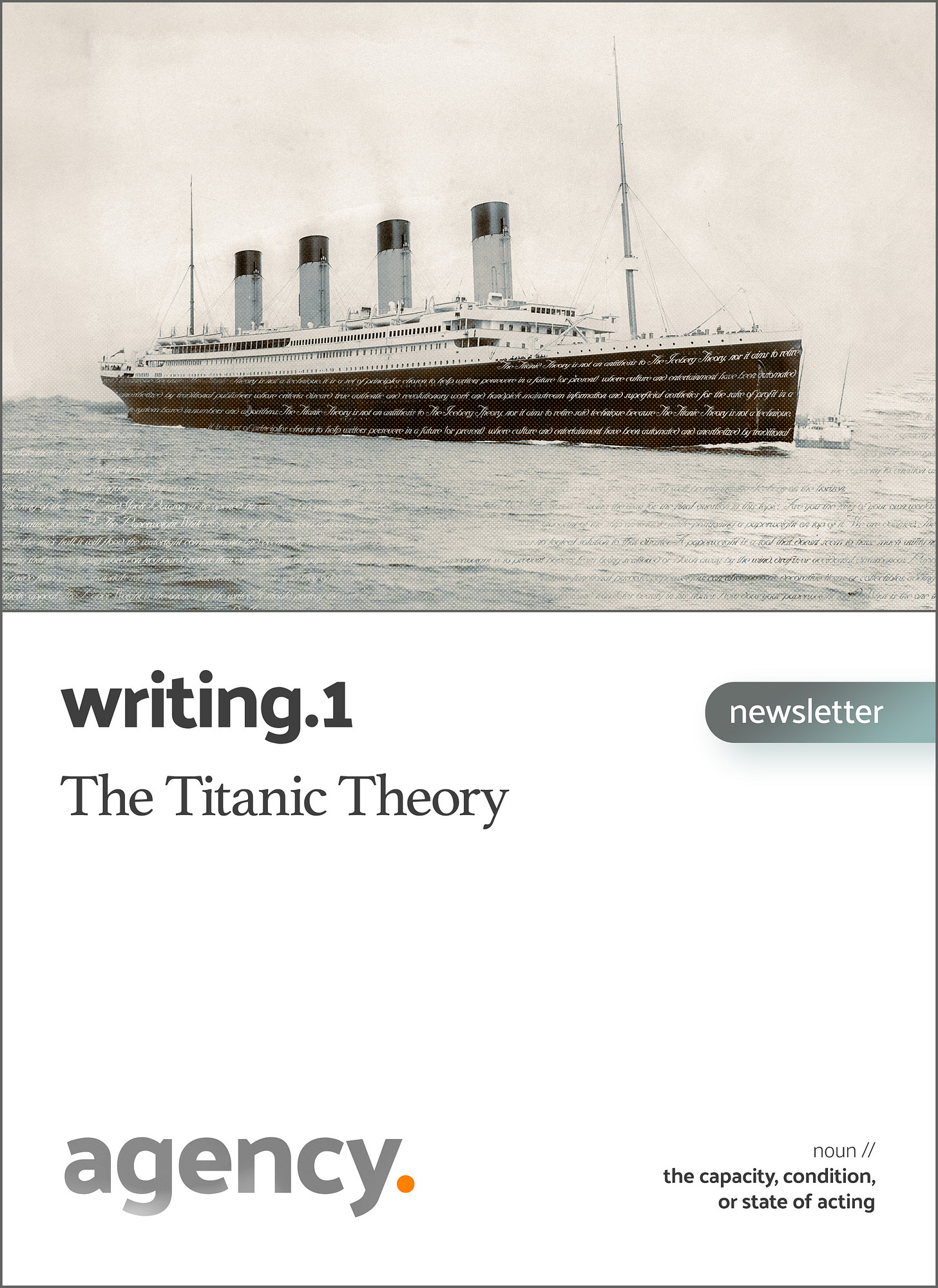Writing.1 - The Titanic Theory
Superpowerdom for your words.
1.1 Introduction
A new perspective for writers of the new era.
Salutations to all architects of words, poets of the universal allegory, typewriters of the mechanical keyboards, translators of the unknown, and sentinels of eternity!
Every person that delves deep into the expression of writing comes across, at some moment, with the Iceberg Theory (Or the theory of omission) coined by the iconic Ernest Hemingway
Said theory is a foundational tool for all writers who seek to not only entertain but also engage their readers with their stories by showing rather than telling.
The writing maxim “Show, don’t tell.” regards the idea that there is always more to a story than what is written on the page, and by omitting details that you already know to be true, you can produce a more captivating read.
After diving deep into online writing communities throughout the last few months, I came to the conclusion that this technique is a powerful tool for experienced writers as much as it is the biggest obstacle behind the venture of writing for new writers.
Not only because grasping the idea behind “show, don’t tell” can be quite complex but also because the readers of this decade are completely different from the readers of past decades.
Doesn’t matter what type of writing you are producing, the truth is that in an era of technical images (videos and photos), capturing the attention of your reader is very much one of the hardest missions to accomplish because reading words requires patience and deep brain work, whereas, watching youtube courses and tiktok memes, requires no interpretational effort at all.
So, one question has been raised in the corners of my mind: How and why should one write in a post-literary era where people’s attention span for reading decreases by the day?
1.2 The Titanic Theory
The perseveration of writing.
The Titanic Theory is not an antithesis to The Iceberg Theory, nor it aims to retire said technique because The Titanic Theory is not a technique, it is a treatise as much as it is a set of principles chosen to help writers persevere in a future (or present) where culture and entertainment have been automated and anesthetized by traditional publishers whose criteria discard true authentic and revolutionary work and handpick mainstream information and superficial aesthetics for the sake of profit in a curation system based in numbers and algorithms.
1.3 The Ship
Your role as a writer.
The Titanic was said to be an unsinkable ship. "God himself couldn't sink this ship." said someone in awe and admiration for that colossal engineering feat.
Yet, it sank.
To claim that we are entering a post-literary era feels like an act of heresy against human expression. Writing has been the true vehicle of our cumulative historical knowledge and artistry ever since someone decided to scratch the wall of a cave.
Yet, Vilém Flusser bravely argued that it does not have a future. (Does Writing have a Future?)
But the death of writing may only truly come if the writers don't wake up from their numbness and lack of responsibility for the gift that was given to them. The Titanic Theory is a wake-up call to all writers.
Because Writers are the ship and the readers are our passengers. Writers are the ship because they are in charge of providing a mesmerizing and unforgettable voyage through the sea of imagination and dreams of their passengers. Yet, writers nowadays don't seem to recognize the importance of their craft. The magnitude and impact of their capacity to dream, create and write.
To write is a feat of the logical brain, a mathematical equation of words, rules, and syntaxes whose solution is to deliver a message. To create is a feat that perfectly combines the rational with the intangible intuition coming from the heart and (un)consciousness.
Yet, I'm seeing writers obsessed with rules and standards when it is their role to question conventions and invent new realities, new worlds, and new rules. Ideas and characters so unique that cause readers and society to mimic them in real life (Read about The Sideways Effect).
Because if as writers we have the capacity to dream and translate these dreams into reality by impressing ink into paper, what is the point of doing so if we are just going to replicate common sense? If you are using common references and techniques to write your message, your messages will be as common as what you were able to replicate.
A Titanic is a writer because it has the capacity to cross thousands of nautical miles with its own engine. A writer is a Titanic of a human being because he/she has the capacity to envision absolutely anything and inscribe it with language.
But if as a writer you are not putting intention, authenticity, experimentation, and critical thinking in your words, then you might very well be missing the Iceberg on the horizon.
"I'm the king of the world!" said Jack Dawson as he opened his arms as if they were wings while standing at the bow of the RMS Titanic. Paving the way for the final question in this topic: Are you the king of your own worlds or have you been writing for others?
1.4 The Paperweight
Setting your style.
While the future of all passengers onboard was uncertain, the chief engineer unfolded the blueprint of the ship on a table while positioning a paperweight on top of it.
"We are doomed. The iceberg damaged the ship's hull, it will flood the watertight compartments and eventually sink." Said the engineer as he understood that there was no logical solution to that disaster.
A paperweight is a tool that doesn't seem to have much utility nowadays considering that we are typing words on keyboards rather than drawing them on paper.
The primary purpose of a paperweight is to prevent papers from being scattered or blown away by the wind or accidental disturbances. Paperweights can be made from various materials such as glass, metal, stone, or ceramic, and they often come in diverse shapes and designs. In addition to their functional purpose, paperweights can also serve as decorative items or collectibles, adding a touch of aesthetic appeal.
The Paperweight is the oneness of the writer. It should portray the writer's personality and aesthetic. How the writer perceives and translates beauty in his stories. How does your paperweight look? What is the one thing you have in your arsenal of ideas and techniques that is only yours? If you have been using the paperweight from other writers, then you are losing the opportunity to truly cause an impression on your readers because they will forget you as soon as they open the next book.
1.5 The Captain
Grasping your ship’s helm.
The captain was responsible for the safety of all passengers and the arrival of the ship to its destination. Yet, he was in his quarters when the iceberg was hit. Some hours later, he locked himself in the bridge and put his hands on the helm as he awaited his destiny.
Neither the engineer nor the captain could predict or calculate the sinking of the Titanic. It is impossible to truly grasp the math behind nature or human unpredictability, math and logic will never be able to truly predict the future and if you are trying to engineer your way toward a successful writing career, you might very well be slowing yourself down.
As a scientific expression, writing should be objective and factually/data-based, but as an artistic expression, writing should be about freedom. It should be about your own faith, love, and self-confidence in writing. It should be making peace with the fact that you might spend your whole life being uncomprehended and that your ideas and words are not spoken in the language of the present. It should be about understanding that you have a responsibility with building a future regardless if you will be acknowledged for it or not.
If you really believe that there is truly aesthetic, inquisitive, and cathartic value in your own worlds, characters, references, knowledge, and books, then it will be simply impossible for you to not prevail as a writer. Because it should be about understanding that you are writing for yourself, as an existential act. It should be about understanding that when you write for yourself, you are writing for the whole universe.
1.6 The Clock
Grasping temporality.
Some hours after the impact, the chief engineer was at the drowning dining hall while staring at the massive antique clock which kept ticking in a perfect rhythm while the ship sank into oblivion.
Someone once said that time is an illusion. Present, past, and future should be one of the most fundamental tools of writers because when a pen inks the paper, there is absolutely no limitation of time whatsoever.
Whatever you write is forever frozen in time when you publish it but what you write about is completely free from the boundaries of time. Precisely because of that, all writers should be true researchers of the past in order to be the builders of the future. Every story ever told and every established writer that walked on earth accomplished one single thing with clockwork precision: they translated the ideas of the time periods they lived, and they mixed the past and the future with everything they liked and disliked from their present.
Your clock, writer, gives you a precious head start because no one ever wrote about that which you like at the exact moment that you are reading this. Your words will be as fresh as the next second that ticks on the clock.
1.7 The Musicians
Grasping tragedy and fortune: drama and comedy.
As people formed lines towards the limited amount of lifeboats, the musicians set their instruments on the deck and played a set of songs in what would probably be the last symphony of their lives.
Even in a moment like that, there is a perspective in which you can see beauty. Beauty is the one thing that machines (AI) might never be truly programmed to understand.
If as a writer with all the worlds of all the languages available in your arsenal, you can't describe beautiful things, then you need to train your eye and that can only be done by consuming artistic expression from a critical role so that you can understand what is interesting and what is boring for you. Tragedies contain as much beauty as comedies, and comedies contain as much drama as tragedies.
If there isn't something tragic or glorious in what you write, then why would it be more interesting than life itself? Write bold ideas, mesmerizing characters, and unique dialogues because you are the captain and your ship should be always a Titanic.
1.8 The Whistle
Grasping tragedy and fortune: drama and comedy.
As Rose was laying almost frozen to death in a wooden chunk floating in the sea, a lifeboat showed up but she couldn't find the vitality to yell. The lifeboat was almost gone when she reached out to the whistle on a person floating right next to her and as soon as she grabbed it, she deposited all hope on that sound and whistled her life to salvation.
If as a writer you are a creator, then this means your capacity is related to the most direct concept of life. Write as if you are saving your readers from the boredom of the real world, from the problems of their real lives, from the uncertainties of the world, and from the potential sadness of their existence.
Through your words, you will be the whistle that resonates hope in the tears or smiles of your readers, so blow your whistle!
1.9 Pandora’s Box
A Fresh Digest on my latest discoveries and some other things.
1.9.1 In the lenses of Thi









1.9.2 In the mind of Gracian
Value quality over quantity. Perfection does not reside in quantity but in quality. Everything that is good is little or rare. We do not value highly what exists in abundance. Instead of being giant and hollow, it is worth more to be small and solid. Some esteem books for their size, as if they were written to exercise the arm when their true purpose is to strengthen intelligence. Only length or volume has never been anything more than mediocrity, and it is a vice of men to want to encompass much, which in truth consists of encompassing nothing. Intensity brings wisdom and makes men and women admirable and of high spirits.
The Art of Worldly Wisdom, How to reach excellence, Proverb 8 - Baltasar Gracián
About the Author
Thiago Patriota
Made in 1996. Born & Raised Brazillian. Bachelor’s Degree in Advertising and Communication. Adept to autodidactism. Curious Soul. Published Author. Founder of Sentient.
That’s me in a nutshell but you can learn more about Agency and myself on the About page!
Contact
+1 302 261 3824
thipatriota@gmail.com





